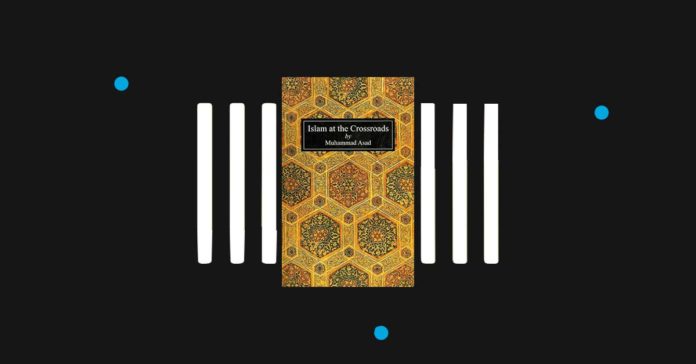Islam at the Crossroads written in 1934 by Muhammad Asad as a wake up call for Muslim youth and a warning from blind imitation of Western civilization.
Here I will share some of my favorite excerpts from the book, which I hope will encourage the readers to open up the book:
- I was able to compare most of the different religious and social views prevalent in the Islamic world in our days. Those studies and comparisons created in me the firm conviction that Islam, as a spiritual and social phenomenon, is still, in spite of all the drawbacks caused by the deficiencies of the Muslims, by far the greatest driving force mankind has ever experienced; and all my interest became, since then, centred around the problem of its regeneration. (p. 12)
- What we call the “religious attitude” is always based on the belief that there exists an all-embracing, transcendental moral law, and that we human beings are bound to submit to its commands. But modern Western civilization does not recognize the necessity of man’s submission to anything save economic or social or national requirements. Its real deity is not of a spiritual kind: it is Comfort. And its real, living philosophy is expressed in a Will to Power for power’s sake. Both have been inherited from the old Roman civilization. (p.33)
- The average Occidental – be he a Democrat or a Fascist, a Capitalist or a Communist, a manual worker or an intellectual – knows only one positive “religion”, and that is the worship of material progress, the belief that there is no other goal in life than to make that very life continually easier or, as the current expression goes, “independent of Nature”. The temples of this “religion” are the gigantic factories, cinemas, chemical laboratories, dance-halls, hydro-electric works: and its priests are bankers, engineers, film stars, captains of industry, record sportsmen. The unavoidable result of this craving for power and pleasure is the creation of hostile groups armed to the teeth and determined to destroy each other whenever and wherever their respective interests clash. And on the cultural side, the result is the creation of a human type whose morality is confined to the question of practical utility alone, and whose highest criterion of good and evil is material success. (p. 44)
- The age in which the insistence on strong family bonds was decisive for the well-being of the group or the clan is being superseded, in the modern West, by an age of collective organization under far wider headings. And in a society which is essentially technological and is being organized at a rapidly increasing pace on purely mechanical lines, the behaviour of a son towards his father is of no great social import so long as those individuals behave within the limits of general decency imposed by the society on the intercourse between its members. Consequently, the Western father daily loses more and more authority over his son, and quite logically the son loses his respect for his father. Their mutual relations are being slowly overruled and, for all practical purposes, made obsolete by the postulates of a mechanized society which has a tendency to abolish all privileges of one individual over another and – in the logical development of this idea – also the privileges due to family relationship. (p. 45)
- to imitate Western civilization in its spirit, its mode of life and its social organization is impossible without dealing a fatal blow to the very existence of Islam as an ideological proposition. (p, 48)
- Western education of Muslim youth is bound to undermine their will to believe in the message of the Prophet, their will to regard themselves as representatives of the religiously-motivated civilization of Islam. There can be no doubt whatever that religious belief is rapidly losing ground among our “intelligentsia” who have absorbed Western values. (p, 63)
- It cannot be denied that in the present state of decadence, the religious atmosphere in many Muslim houses is of such a low and intellectually degraded type that it may produce in the growing youth the first incentive to turn his back on religion. This may be so; but in the case of the education of young Muslims on Western lines the effect not only may be but most probably will be an anti-religious attitude in later life. (p, 65)
- The superiority of one culture or civilization over another does not consist in the possession of a greater amount of scientific knowledge (although the latter is most desirable), but in its ethical energy, in its greater ability to explain and to coordinate the various aspects of human life. And in this respect Islam surpasses every other culture. We have only to follow its rules in order to achieve the utmost that human beings are capable of achieving. But we cannot and must not imitate Western civilization if we wish to preserve and to revive the values of Islam. The harm which the intellectual influence of that civilization causes in the body of Islam is far greater than the material benefit which it could possibly confer. (p, 73)
- The tendency to imitate a foreign civilization is invariably the outcome of a feeling of inferiority. This, and nothing else, is the matter with Muslims who imitate Western civilization. They contrast its power and technical skill and brilliant surface with the sad misery of the world of Islam: and they begin to believe that in our time there is no way but the Western way. To blame Islam for our own shortcomings is the fashion of the day. At best, our so-called intellectuals adopt an apologetic attitude and try to convince themselves and others that Islam is compatible with the adoption of Western values. (p, 79)
- A Muslim must live with his head held high. He must realize that he is distinct and different from the rest of the world, and he must learn to be proud of his being different. He should endeavour to preserve this difference as a precious quality, and pronounce it boldly to the world instead of apologizing for it and trying to merge into other cultural circles. (p, 79)
- Under the impact of new ideas and conflicting currents, so characteristic of the period in which we are living, Islam can no longer afford to remain an empty form. Its magic sleep of centuries is broken; it has to rise or to die. The problem facing the Muslims today is the problem of the traveller who has come to a crossroads. He can remain standing where he is; but that would mean death by starvation. He can choose the road bearing the sign “Towards Western Civilization”: but then he would have to say good-bye to his past forever. Or he can choose the other road, the one over which is written: “Towards the Reality of Islam”. It is this road alone which can appeal to those who believe in their past and in the possibility of its transformation into a living future.
- Islam, in its true meaning, cannot benefit by an assimilation of Western civilization. But, on the other hand, the Muslim world has today so little energy left that it does not offer sufficient resistance. The remnants of its cultural existence are being levelled to the ground under the pressure of Western ideas and customs. A note of resignation is perceivable; and resignation, in the life of nations and cultures, means death. (p, 98)
- What appears to be the decay of Islam is in reality nothing but the death and the emptiness in our hearts, which are too idle and too insensitive to hear the eternal voice. No sign is visible that mankind, in its present stature, has outgrown Islam. It has not been able to produce a better system of ethics than that expressed in Islam; it has not been able to put the idea of human brotherhood on a practical footing, as Islam does in its supra-national concept of the ummah; it has not been able to create a social structure in which the conflicts and frictions between its members are as efficiently reduced to a minimum as in the social plan of Islam; it has not been able to enhance the dignity of man, his feeling of security, his spiritual hope – and last, but surely not least, his happiness. (p, 99)









